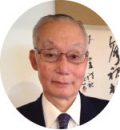In addition to the listed categories of membership in the British Chamber of Commerce in Japan (BCCJ), a special classification is reserved for individuals who have gone above and beyond in developing UK–Japan relations.
As of 2016, the BCCJ recognises six lifetime BCCJ honorary members: Ian de Stains OBE; Hiroaki Fujii; Sadayuki Hayashi GCVO; Kazuko Kon MBE; Robin J. Maynard MBE and Masaki Orita.
There is no singular act of service that defines these honorary members, but each has made significant contributions towards the overarching BCCJ goal of aiding members and strengthening UK–Japan ties. The first mention of honorary members appears in the 1974 BCCJ Constitution, which states that the designation thereof must be agreed upon by a majority of the Executive Committee (Excom).
David Bickle, BCCJ president, said: “Although these members have stepped down from positions of leadership within the Chamber, they remain trusted and respected figures in the business and diplomatic community. With uniquely impressive depth and breadth to their career experiences, they remain important figures in the field of UK–Japan relations. The BCCJ is delighted that they remain supportive of the Chamber, and part of its thriving network”.
In addition to the current six honorary members, the BCCJ recognises the late Sukeyoshi Yamamoto’s invaluable contributions as the first Japanese elected to Excom, in 2000. Yamamoto served 12 years in the BCCJ leadership, during which time he prepared much-appreciated “weather reports”—economic summaries of what was happening in Japanese business and industry.

Ian de Stains OBE
Chamber role
Ian de Stains, the first elected executive director of the BCCJ, who also oversaw the first honorary member appointment in 1991, admits there was never a defined role for these individuals.
“When the system was introduced, it was principally for returning Japanese ambassadors to the Court of St. James’s. Only slowly were other members brought in, and it was more by way of recognition”, he said. De Stains served as BCCJ executive director for nearly 25 years, and was granted a Lifetime Achievement Award at the British Business Awards in 2010, the year before his retirement.

Masaki Orita
Masaki Orita, Japanese ambassador to the UK from 2001 to 2004, says the role of honorary members is that of advisor to the BCCJ, based on their personal experiences as diplomatic or corporate leaders. During his tenure at the embassy, Orita constantly organised events designed to encourage networking and information sharing among the Japanese and British business communities. He often gave detailed speeches about Japan’s economic situation, as well as that of the international community, in order to promote UK–Japan relations in addressing wide-ranging commercial issues.
Orita was instrumental in convincing the UK government to participate in the Aichi World Exposition in 2005. At that time, he says, the war in Iraq was the government’s main concern, and persuading officials to allocate budget to the expo was not easy.

Hiroaki Fujii
Hiroaki Fujii also served as Japanese ambassador to the UK and subsequently as president of the Japan Foundation. He follows the news in BCCJ ACUMEN and still attends events, as part of his role as honorary member. Today, Fujii is president of the Mori Arts Center, and as such serves as a trustee for various organisations with UK–Japan ties. Promoting the Chamber as a business advocate for its members is the enduring role of all honorary members.
Then and now
Reflecting on the BCCJ’s progress since its 1948 inception, Robin J. Maynard says: “In 1978, when I joined, the BCCJ was like a stuffy club for old gentlemen. The committee met at the offices of its members by rotation, the magazine comprised sheets of outdated and stapled green paper, and women were a rare species hardly spotted at events”.

Robin Maynard MBE
Maynard is credited with giving the Chamber its first dedicated office at the headquarters of his own company, charging what he calls a “peppercorn rent”, in consideration of the BCCJ’s weak finances at the time. He then became a “Mr. Behind-the-Scenes” to the Chamber, encouraging firms and individuals to join the blossoming organisation.
“We now have women in leadership roles, advanced technology and a really decent, informative magazine. In tandem with the British Embassy, and given the size and volunteering nature of the current BCCJ, I believe that the Chamber is now maximising its role of promoting business in Japan”, Maynard emphasised.
De Stains also highlights the key relationship with the British Embassy Tokyo. “The BCCJ has remained a strong presence in the Japanese market and has grown rapidly, especially in recent years, which is really good to see. The enduring relationship it has with the British Embassy is just one reason for its prominence in promoting UK business interests”, he said.

Kazuko Kon MBE
Kazuko Kon was awarded BCCJ Lifetime Honorary Membership at her retirement reception in 2009, after having worked an impressive 40 years as a commercial officer at the British Embassy. One of her primary responsibilities was nurturing the relationship with the BCCJ, an organisation considered a strategic contact with the business community.
“From 1988 until around 2002, the embassy worked hard to promote UK exports to and investment in Japan, under several trade missions such as the Opportunity Japan Campaign. During that period, we received many VIPs and prime ministers, as well as Royal Family members and senior business leaders. On each occasion, BCCJ members were involved in organising events, meetings and receptions”, Kon said.
She recalled: “For me, the most remarkable event was the opening ceremony of Yokohama Business Park’s British Industry Centre, which was attended by Prime Minister Tony Blair in January 1997”.
Like Maynard, Fujii mentions the expansion and improvement of the BCCJ’s flagship magazine, BCCJ ACUMEN, as a point of pride.
“The BCCJ has been working [harder and harder] to cement UK–Japan ties, which I believe represents one of the most important relationships in the world. In particular, the quality of BCCJ ACUMEN magazine has improved remarkably. It is a rare magazine [that enables] many Japanese to learn what non-Japanese living in Japan are thinking”, he said.
Finally, Orita applauds the BCCJ’s growth and importance when compared with other chambers of commerce in Japan.
Where next?
All honorary members agree the Chamber’s ultimate priority is promoting the interests of its members.
“I believe the BCCJ does this with tremendous professionalism”, de Stains said. Orita and Maynard see the Brexit decision as a defining moment in the Chamber’s history. “The most important function of BCCJ today is explaining the implications of the Brexit vote to Japanese people, especially from a business point of view”, Orita said.
Maynard concurred, citing the BCCJ’s role in ensuring “the calm and adroit handling of all Brexit issues, in tandem with the British Embassy”. As one of the longest-serving commercial officers at the embassy, Kon also emphasised the need to continue developing the BCCJ–embassy relationship, as well as ties with other BCCJ partners, such as the British Council Japan and the European Business Council in Japan.
Fujii added, “Japan needs to open the country further to enhance diversity. As such, the BCCJ can make a significant contribution by letting us know—naturally, in a polite, Japanese way—about barriers that hinder business here, as well as those that hamper the private lives of its members”.


